The Gas Liquid Cooled Home Standby Gensets Market is estimated to be valued at USD 1.4 billion in 2025 and is projected to reach USD 2.5 billion by 2035, registering a compound annual growth rate (CAGR) of 6.4% over the forecast period. Early expansion is moderate, driven by adoption in residential areas requiring reliable backup power and by increasing awareness of genset efficiency and noise reduction features.
Mid-period growth accelerates as more households and small commercial units integrate liquid-cooled systems, benefiting from improved durability, enhanced thermal management, and longer operational lifespans. Later years reflect a stabilized yet consistent rise, supported by replacement cycles, urban expansion, and consumer preference for low-maintenance, resilient power solutions. Year-on-year growth demonstrates a smooth trajectory, with early gains fueled by adoption in high-outage regions and later growth reinforced by broader market penetration and regulatory encouragement for cleaner fuel use.
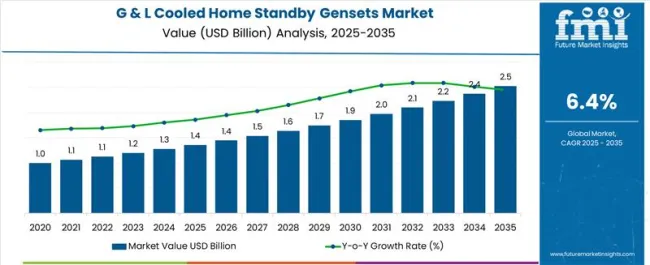
| Metric | Value |
|---|---|
| Gas Liquid Cooled Home Standby Gensets Market Estimated Value in (2025 E) | USD 1.4 billion |
| Gas Liquid Cooled Home Standby Gensets Market Forecast Value in (2035 F) | USD 2.5 billion |
| Forecast CAGR (2025 to 2035) | 6.4% |
The gas liquid cooled home standby gensets market is experiencing notable expansion due to increased demand for uninterrupted power supply, especially in residential areas facing frequent grid failures and weather-related disruptions. As climate change intensifies and infrastructure reliability becomes a concern, households are increasingly opting for reliable backup solutions.
Gas liquid cooled systems offer enhanced thermal management, extended operational life, and quieter performance compared to air cooled counterparts, making them ideal for modern residential environments. Technological improvements in remote monitoring, automation, and energy efficiency are also supporting adoption.
The favorable cost of natural gas and environmental advantages over diesel further contribute to the growing preference for gas-powered gensets. Looking ahead, the market is poised for consistent growth as homeowners seek resilient energy systems that offer long-term dependability, low maintenance, and environmental compliance.
The gas liquid cooled home standby gensets market is segmented by power rating, phase, and geographic regions. By power rating, the gas liquid cooled home standby gensets market is divided into ≤ 25 kVA, > 25 kVA - 50 kVA, > 50 kVA - 100 kVA, and > 100 kVA. In terms of the phase of the gas-liquid cooled home standby gensets market, it is classified into single-phase and three-phase. Regionally, the gas-liquid cooled home standby gensets industry is classified into North America, Latin America, Western Europe, Eastern Europe, the Balkan & Baltic Countries, Russia & Belarus, Central Asia, East Asia, South Asia & Pacific, and the Middle East & Africa.
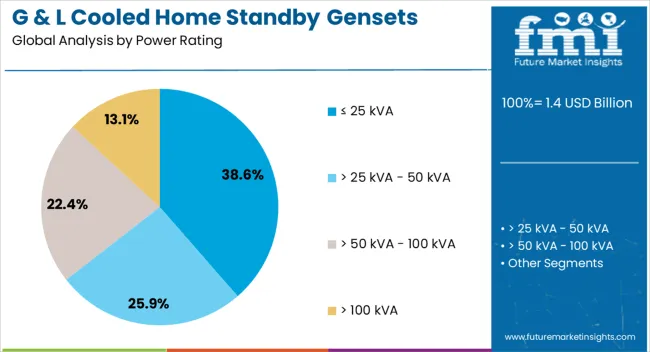
The power rating segment of ≤ 25 kVA is projected to hold 38.60% of total market revenue by 2025, making it the leading subcategory. This segment is favored due to its suitability for average household loads, including essential appliances and HVAC systems.
Compact design, lower installation costs, and fuel efficiency make these gensets ideal for single family homes and smaller residential structures. Additionally, ease of integration with home energy systems and growing availability through retail and contractor channels are strengthening its market position.
The segment's dominance reflects rising consumer preference for scalable and cost-effective standby solutions that meet everyday residential backup needs without overcapacity.
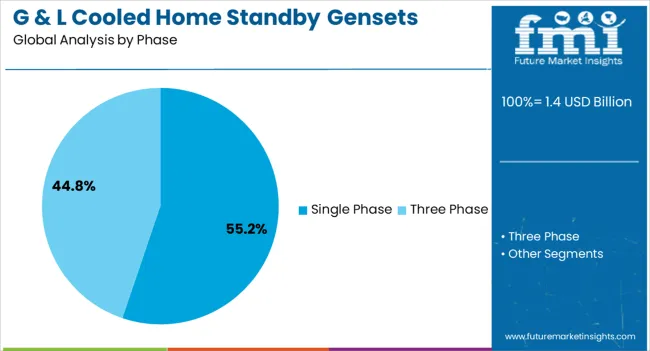
The single phase segment is expected to contribute 55.20% of total revenue within the phase category by 2025, marking it as the dominant configuration. Its prominence is driven by its alignment with typical residential electrical setups, making installation straightforward and cost-efficient.
Single phase gensets are commonly selected for home applications due to their compatibility with standard wiring and lower energy demand scenarios. Their simplified maintenance and operation further enhance appeal for homeowners seeking hassle-free backup power solutions.
As the focus grows on convenient and affordable residential energy security, single phase gensets continue to lead the market due to their accessibility and performance reliability.
The gas liquid cooled home standby gensets market is propelled by increasing power supply needs, cost efficiency, compliance with regulations, and continuous technological innovation. These factors contribute to their expanding role in residential power backup solutions.
Recent developments in gas liquid cooled gensets have introduced smart connectivity and remote monitoring features, allowing homeowners to track performance and manage their energy usage from anywhere. These technological enhancements enable better control and provide real-time updates, enhancing user convenience. The ability to monitor genset performance remotely also allows for proactive maintenance, ensuring the system operates efficiently and reducing the risk of failure.
Gas liquid cooled gensets are increasingly being integrated with home energy management systems, enabling seamless coordination with other energy sources like solar panels or battery storage systems. This integration provides a more holistic energy solution, improving the overall efficiency of the home’s power consumption. Homeowners benefit from optimized energy management, reducing waste and enhancing the cost-effectiveness of their backup power systems.
Innovations in fuel efficiency and emission control technologies are improving the environmental footprint of gas liquid cooled gensets. These advancements not only help meet stricter regulations but also appeal to environmentally conscious consumers. Gensets with improved fuel efficiency consume less fuel, reducing operational costs and environmental impact, while enhanced emission control features help minimize harmful output, making these systems more sustainable.
The growing demand for user-friendly and technologically advanced products has driven continuous improvements in gas liquid cooled gensets. Manufacturers are focused on refining product designs to enhance ease of use and overall performance. As consumers increasingly seek reliable, efficient, and low-maintenance solutions, these innovations play a crucial role in meeting customer expectations. Manufacturers are aligning their offerings to keep pace with evolving demands, ensuring that gensets provide maximum value and convenience.
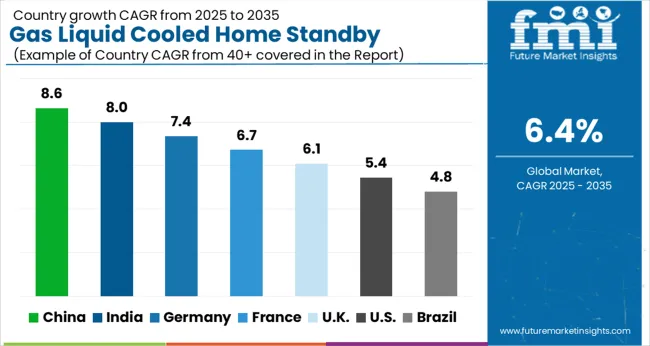
| Country | CAGR |
|---|---|
| China | 8.6% |
| India | 8.0% |
| Germany | 7.4% |
| France | 6.7% |
| UK | 6.1% |
| USA | 5.4% |
| Brazil | 4.8% |
The gas liquid cooled home standby gensets market is projected to expand at a global CAGR of 6.4% from 2025 to 2035, driven by the increasing demand for reliable power backup, energy efficiency, and lower maintenance needs. China leads with a CAGR of 8.6%, fueled by rising power outages, rapid urbanization, and the growing adoption of backup power solutions in residential areas. India follows at 8.0%, supported by increasing infrastructure development, frequent power disruptions, and a rising demand for residential backup systems. France achieves 6.7% growth, driven by the integration of more energy-efficient and eco-friendly genset technologies.
The United Kingdom records 6.1%, reflecting steady adoption of standby power systems due to growing residential demand for uninterrupted power supply. The United States posts 5.4%, driven by regulatory mandates for home energy efficiency and a steady demand for standby power systems in suburban and rural areas. The analysis spans more than 40 countries, with these markets serving as reference points for capacity planning, product innovation, and competitive positioning in the global gas liquid cooled home standby gensets industry.
The gas liquid cooled home standby gensets market in the UK is projected to grow at a CAGR of 6.1% from 2025 to 2035, just below the global average of 6.4%. Between 2020–2024, the CAGR was 4.8%, driven by steady growth, but somewhat impacted by economic challenges and slower adoption of new technologies in residential backup power solutions. The market's acceleration in the upcoming period is expected to be fueled by stronger regulatory frameworks, growing energy efficiency demands, and the shift towards low-maintenance and eco-friendly genset technologies.
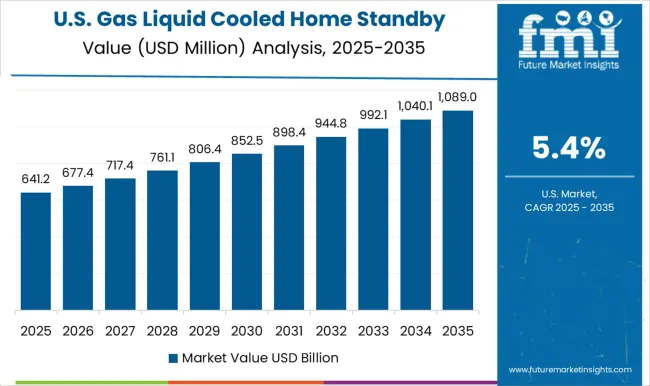
The USA gas liquid cooled home standby gensets market is forecast to grow at a CAGR of 5.4% from 2025 to 2035, supported by rising demand for reliable backup power solutions. Between 2020–2024, the CAGR was 3.9%, influenced by slower adoption due to higher initial investment costs and limited technology upgrades. However, the growth outlook has improved due to increased weather-related power outages and the growing emphasis on energy-efficient backup systems. In the coming period, demand will be driven by advancements in energy management systems and a shift toward cleaner energy solutions.
China is expected to experience a high CAGR of 8.6% from 2025 to 2035, significantly surpassing the global average of 6.4%. Between 2020–2024, the CAGR was 5.4%, reflecting moderate growth due to higher raw material costs and slower adoption of high-efficiency gensets. The market is expected to accelerate due to increased government initiatives pushing for clean energy adoption and growing concerns over power reliability. China’s rapid rural-urban energy gap creates opportunities for gas liquid cooled gensets, with technological advancements in the energy sector further driving demand for these systems.
India is projected to grow at a CAGR of 8.0% from 2025 to 2035, exceeding the global average of 6.4%. Between 2020–2024, the CAGR stood at 6.2%, driven by steady growth in residential power backup adoption, but slowed by infrastructure challenges and slow consumer uptake of advanced systems. The improved outlook for 2025–2035 is driven by the increasing need for reliable power in both urban and rural areas, a growing middle class, and government incentives for energy-efficient systems. Gas liquid cooled gensets will play a vital role in addressing India’s increasing power demands and improving energy security.
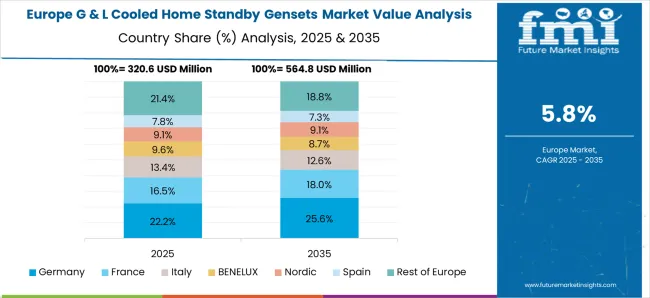
The gas liquid cooled home standby gensets market in France is projected to grow at a CAGR of 6.7% from 2025 to 2035, surpassing the global average of 6.4%. Between 2020–2024, the CAGR was 5.2%, reflecting moderate market growth due to factors such as economic uncertainties and slow uptake of residential backup power solutions. However, growth in the upcoming period is driven by the adoption of energy-efficient technologies, regulatory pressure for cleaner energy solutions, and increased awareness about the importance of reliable power backup. France's transition towards sustainable energy and government incentives will further propel market expansion.
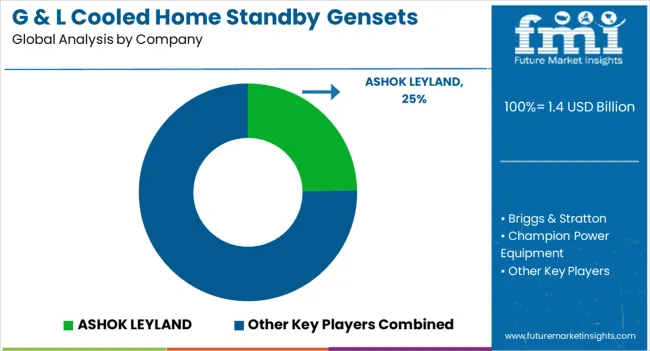
Cummins Inc. stands as a key leader, offering a wide range of gensets featuring advanced cooling technologies and high fuel efficiency. Generac Power Systems, Inc. follows with a strong portfolio of gas liquid-cooled generators that prioritize low maintenance and long operational lifespans. Briggs & Stratton specializes in cost-effective solutions, offering reliable gensets for residential and commercial applications.
Kohler Co. brings innovation with premium-quality systems that incorporate smart monitoring features and energy-saving mechanisms. Eaton focuses on the seamless integration of gensets with home energy management systems, enhancing overall efficiency. Honeywell International Inc. and Siemens are recognized for integrating advanced digital controls into their gensets, improving operational efficiency and remote monitoring capabilities.
Mahindra Powerol and Kirloskar offer strong competition with their locally manufactured solutions tailored to emerging markets, ensuring reliability and cost-effectiveness. Winco and Multiquip Inc. have a strong presence in the North American market, offering heavy-duty gensets designed for high-demand applications.
Competitive strategies center on technological innovations, enhanced fuel efficiency, product durability, and seamless integration with home automation systems. As power reliability concerns rise, key players are prioritizing sustainable energy solutions and focusing on partnerships with OEMs to expand market share.
| Item | Value |
|---|---|
| Quantitative Units | USD 1.4 Billion |
| Power Rating | ≤ 25 kVA, > 25 kVA - 50 kVA, > 50 kVA - 100 kVA, and > 100 kVA |
| Phase | Single Phase and Three Phase |
| Regions Covered | North America, Europe, Asia-Pacific, Latin America, Middle East & Africa |
| Country Covered | United States, Canada, Germany, France, United Kingdom, China, Japan, India, Brazil, South Africa |
| Key Companies Profiled | ASHOK LEYLAND, Briggs & Stratton, Champion Power Equipment, Cummins Inc., Eaton, Generac Power Systems, Inc., Gillette Generators, Honeywell International Inc., Kirloskar, Kohler Co., MAHINDRA POWEROL, Multiquip Inc., Siemens, and Winco |
| Additional Attributes | Dollar sales projections over the next 5-10 years, market share analysis of key players, and growth drivers like power reliability and energy efficiency. |
The global gas liquid cooled home standby gensets market is estimated to be valued at USD 1.4 billion in 2025.
The market size for the gas liquid cooled home standby gensets market is projected to reach USD 2.5 billion by 2035.
The gas liquid cooled home standby gensets market is expected to grow at a 6.4% CAGR between 2025 and 2035.
The key product types in gas liquid cooled home standby gensets market are ≤ 25 kva, > 25 kva - 50 kva, > 50 kva - 100 kva and > 100 kva.
In terms of phase, single phase segment to command 55.2% share in the gas liquid cooled home standby gensets market in 2025.






Our Research Products

The "Full Research Suite" delivers actionable market intel, deep dives on markets or technologies, so clients act faster, cut risk, and unlock growth.

The Leaderboard benchmarks and ranks top vendors, classifying them as Established Leaders, Leading Challengers, or Disruptors & Challengers.

Locates where complements amplify value and substitutes erode it, forecasting net impact by horizon

We deliver granular, decision-grade intel: market sizing, 5-year forecasts, pricing, adoption, usage, revenue, and operational KPIs—plus competitor tracking, regulation, and value chains—across 60 countries broadly.

Spot the shifts before they hit your P&L. We track inflection points, adoption curves, pricing moves, and ecosystem plays to show where demand is heading, why it is changing, and what to do next across high-growth markets and disruptive tech

Real-time reads of user behavior. We track shifting priorities, perceptions of today’s and next-gen services, and provider experience, then pace how fast tech moves from trial to adoption, blending buyer, consumer, and channel inputs with social signals (#WhySwitch, #UX).

Partner with our analyst team to build a custom report designed around your business priorities. From analysing market trends to assessing competitors or crafting bespoke datasets, we tailor insights to your needs.
Supplier Intelligence
Discovery & Profiling
Capacity & Footprint
Performance & Risk
Compliance & Governance
Commercial Readiness
Who Supplies Whom
Scorecards & Shortlists
Playbooks & Docs
Category Intelligence
Definition & Scope
Demand & Use Cases
Cost Drivers
Market Structure
Supply Chain Map
Trade & Policy
Operating Norms
Deliverables
Buyer Intelligence
Account Basics
Spend & Scope
Procurement Model
Vendor Requirements
Terms & Policies
Entry Strategy
Pain Points & Triggers
Outputs
Pricing Analysis
Benchmarks
Trends
Should-Cost
Indexation
Landed Cost
Commercial Terms
Deliverables
Brand Analysis
Positioning & Value Prop
Share & Presence
Customer Evidence
Go-to-Market
Digital & Reputation
Compliance & Trust
KPIs & Gaps
Outputs
Full Research Suite comprises of:
Market outlook & trends analysis
Interviews & case studies
Strategic recommendations
Vendor profiles & capabilities analysis
5-year forecasts
8 regions and 60+ country-level data splits
Market segment data splits
12 months of continuous data updates
DELIVERED AS:
PDF EXCEL ONLINE
Liquid Cooled Home Standby Gensets Market Size and Share Forecast Outlook 2025 to 2035
Air Cooled Home Standby Gensets Market Size and Share Forecast Outlook 2025 to 2035
Air Cooled Three Phase Home Standby Gensets Market Size and Share Forecast Outlook 2025 to 2035
Air Cooled Single Phase Home Standby Gensets Market Size and Share Forecast Outlook 2025 to 2035
Single Phase Air Cooled Home Standby Gensets Market Size and Share Forecast Outlook 2025 to 2035
Diesel Fueled Air Cooled Home Standby Gensets Market Size and Share Forecast Outlook 2025 to 2035
Home Standby Gensets Market Size and Share Forecast Outlook 2025 to 2035
Single Phase Home Standby Gensets Market Size and Share Forecast Outlook 2025 to 2035
Standby Gas Fueled Power Rental Market Size and Share Forecast Outlook 2025 to 2035
Gasoline Gensets Market Size and Share Forecast Outlook 2025 to 2035
Coal Gasification Liquid Hydrogen Market Size and Share Forecast Outlook 2025 to 2035
Liquid Desiccant Natural Gas Dehydration Unit Market Size and Share Forecast Outlook 2025 to 2035
Standby Commercial Diesel Gensets Market Size and Share Forecast Outlook 2025 to 2035
Commercial Gas Gensets Market Size and Share Forecast Outlook 2025 to 2035
Single Phase Gasoline Gensets Market Size and Share Forecast Outlook 2025 to 2035
Liquid Processing Filter Market Size and Share Forecast Outlook 2025 to 2035
Gas Insulated Switchgear (GIS) Bushing Market Size and Share Forecast Outlook 2025 to 2035
Gas Discharge Tube (GDT) Arresters Market Size and Share Forecast Outlook 2025 to 2035
Liquid Mandrel Release Agent Market Size and Share Forecast Outlook 2025 to 2035
Liquid Filling Machine Market Size and Share Forecast Outlook 2025 to 2035

Thank you!
You will receive an email from our Business Development Manager. Please be sure to check your SPAM/JUNK folder too.
Chat With
MaRIA